Unit 2 I’ll help to clean up the city parks. Section A课件
文档属性
| 名称 | Unit 2 I’ll help to clean up the city parks. Section A课件 |
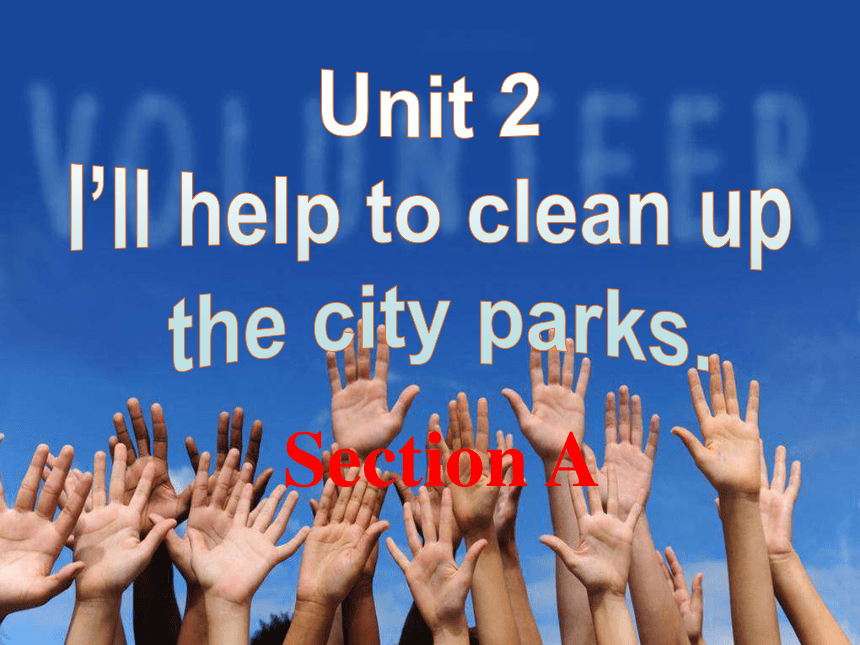
|
|
| 格式 | zip | ||
| 文件大小 | 2.8MB | ||
| 资源类型 | 教案 | ||
| 版本资源 | 人教新目标(Go for it)版 | ||
| 科目 | 英语 | ||
| 更新时间 | 2018-03-11 00:00:00 | ||
图片预览

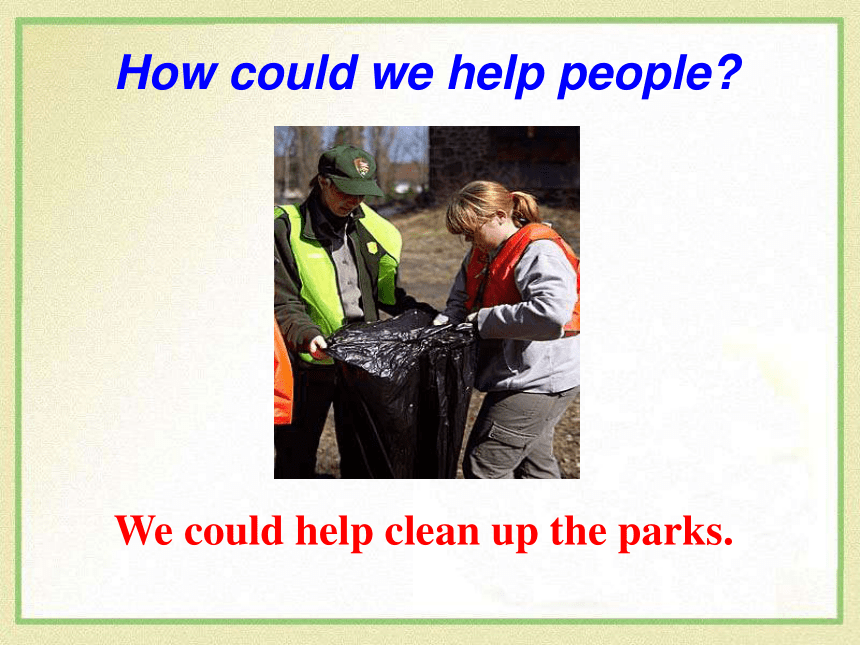
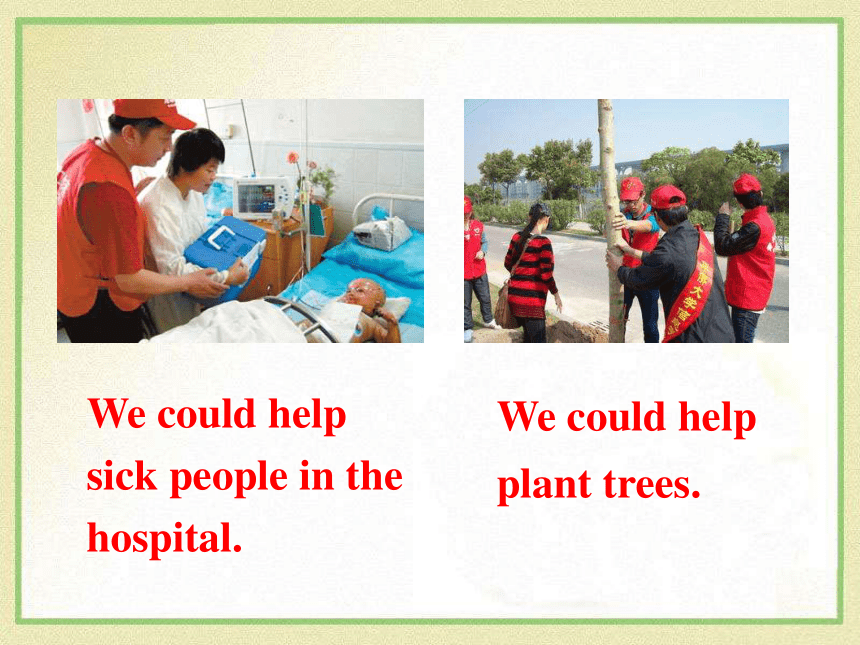
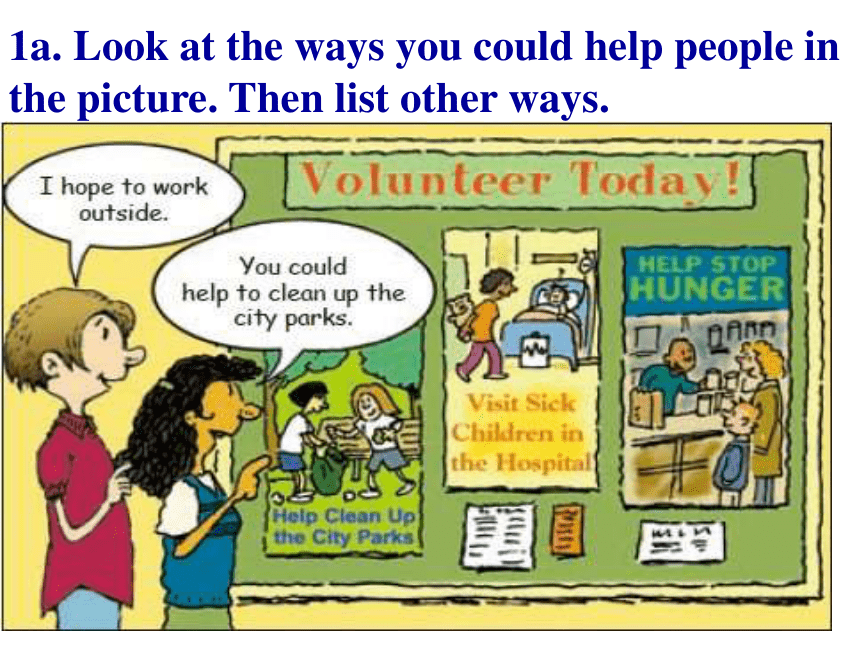
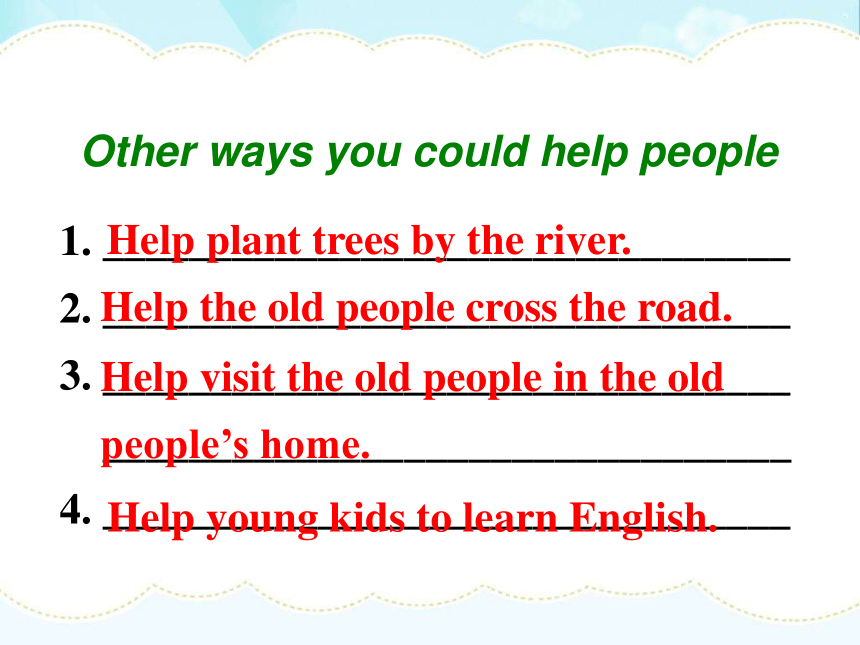
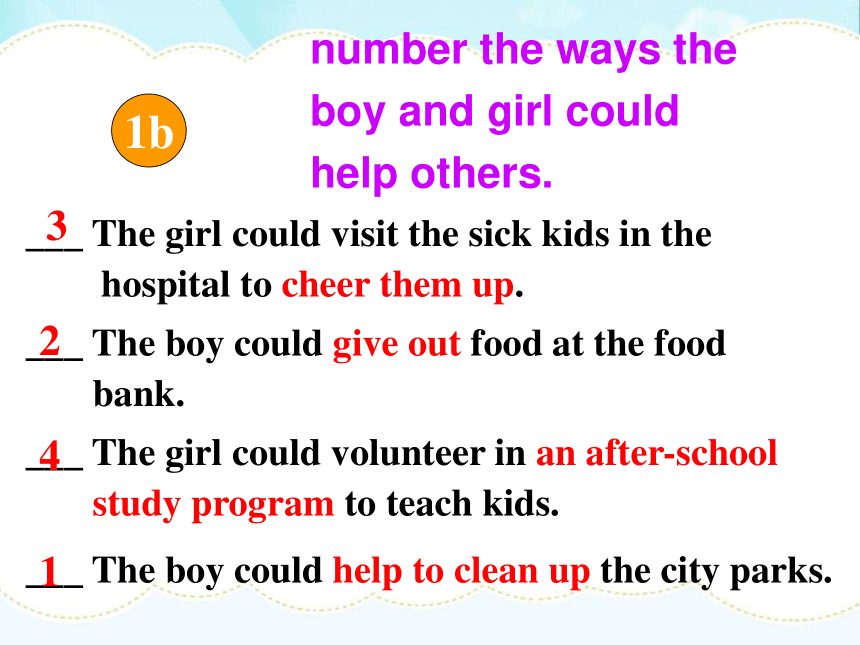
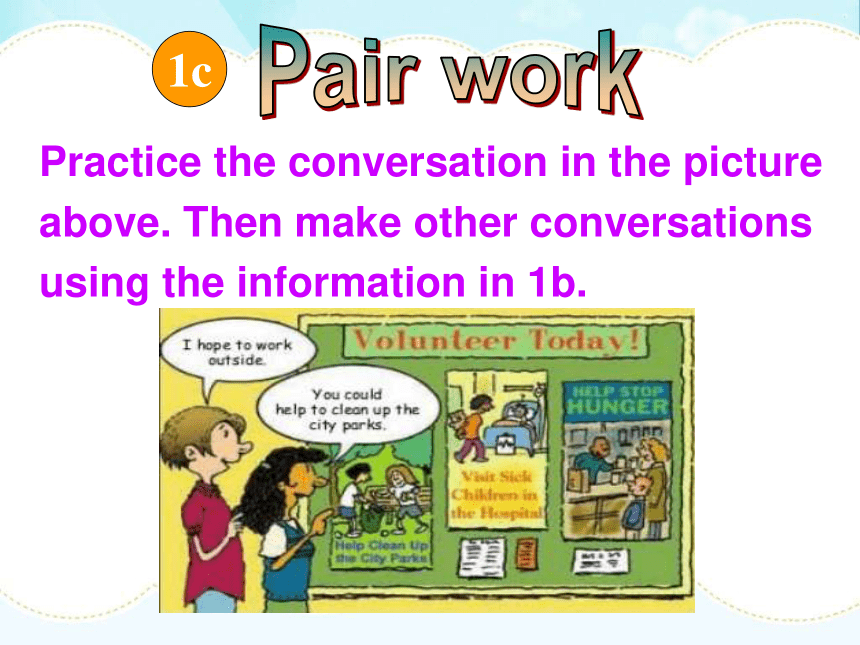
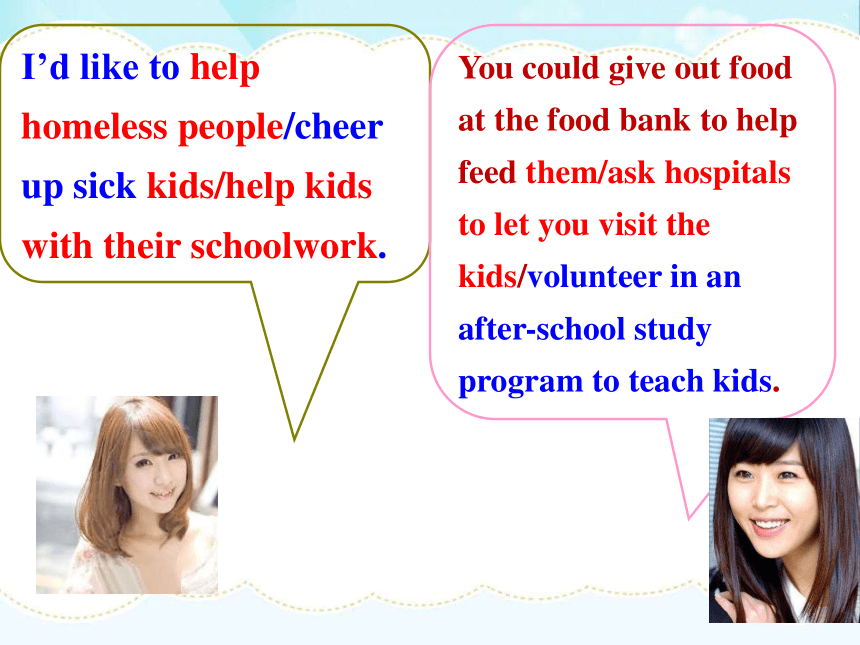
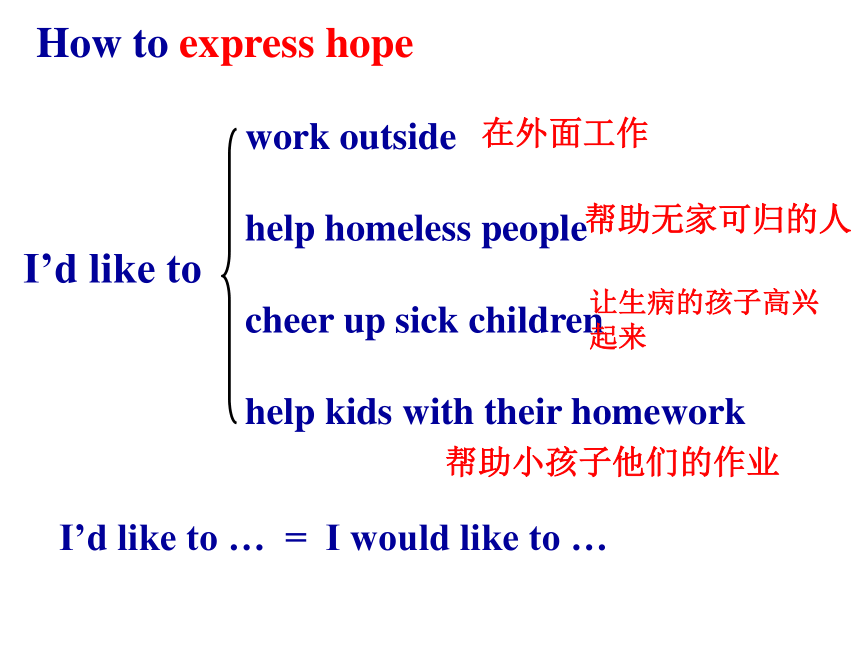
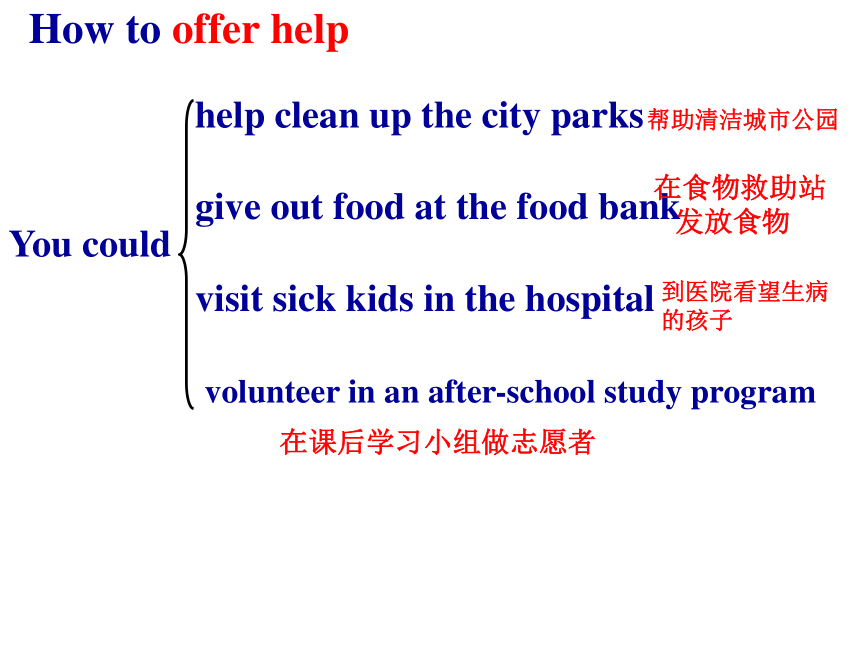
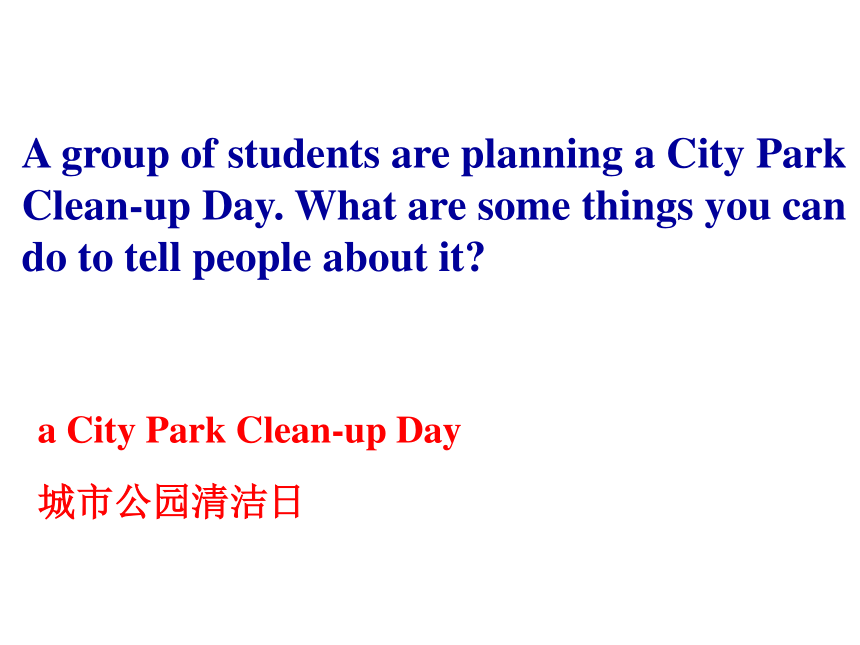
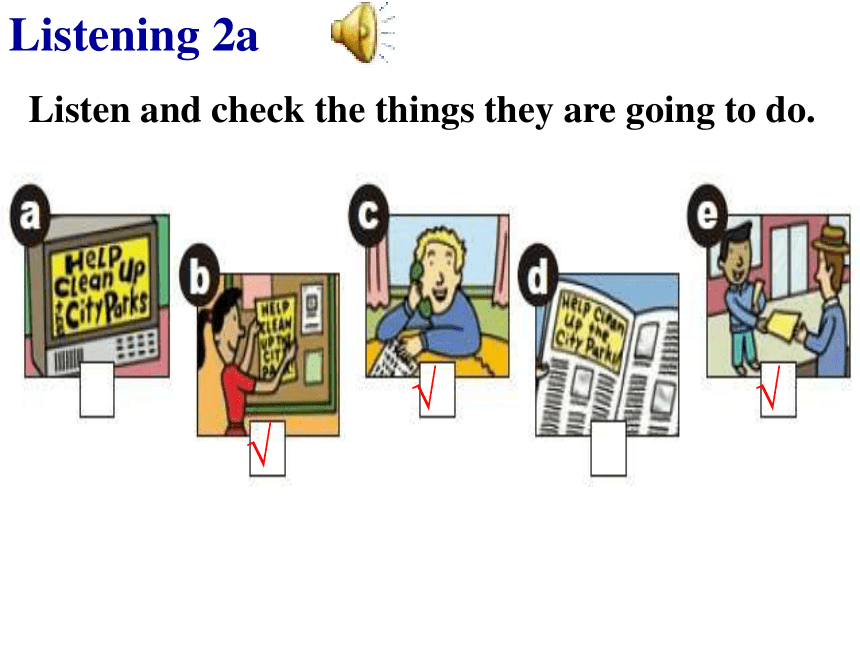
文档简介
课件76张PPT。Unit 2
I’ll help to clean up
the city parks.Section A How could we help people?We could help clean up the parks.We could help sick people in the hospital.We could help plant trees. 1a. Look at the ways you could help people in the picture. Then list other ways.1. ________________________________
2. ________________________________
3. ________________________________
________________________________
4. ________________________________Other ways you could help peopleHelp the old people cross the road.Help visit the old people in the old people’s home. Help plant trees by the river.Help young kids to learn English. number the ways the boy and girl could help others. 1b1234Pair work1cPractice the conversation in the picture above. Then make other conversations using the information in 1b.I’d like to help homeless people/cheer up sick kids/help kids with their schoolwork.You could give out food at the food bank to help feed them/ask hospitals to let you visit the kids/volunteer in an after-school study program to teach kids. I’d like to work outside
help homeless people
cheer up sick children
help kids with their homework
在外面工作帮助无家可归的人让生病的孩子高兴
起来帮助小孩子他们的作业I’d like to … = I would like to …How to express hopeYou could help clean up the city parks
give out food at the food bank
visit sick kids in the hospital
volunteer in an after-school study program
帮助清洁城市公园在食物救助站
发放食物到医院看望生病
的孩子在课后学习小组做志愿者How to offer helpA group of students are planning a City Park
Clean-up Day. What are some things you can do to tell people about it?a City Park Clean-up Day城市公园清洁日Listening 2a√√√Listen and check the things they are going to do.advertise on TVput up signscall up studentsadvertise in newspapershand out notices
come up withput offput upFill in the blanks. 2b4. Let’s make some notices, too. Then I’ll ____ them ____ after school.
5. We could each ____ ___ 10 students and ask them to come. give outcall up come up with
give out
put off doing sth
make a plan
put up signs
hand out
call up sb
write down
make notices 制作小广告
Phrasal verbs:提出,想出分发, 发放推迟做某事制定计划张贴标语分发给某人打电话写下Pair workMake a conversation using the information in 2a and 2b.2cWe need to come up with a plan for the City Park Clean-Up Day.Let’s have lunch first. No, we need to start now. Clean-Up
Day is only two weeks from now. B1: We need to come up with a plan for the City Park Clean-Up Day.
G1: Let’s have lunch first.
G2: No, we need to start now. Clean-Up Day is only two weeks from now.
B2:I agree. While we talk, I'll write down all our
ideas, then decide which ideas are best.
G1: We could put up signs.
B2:That's a good idea.
G2:I'll hand out notices after school.
B1:OK, And we could each call up ten people and
ask them to come.
B2:We're coming up with many good ideas, aren't
we?1. You could help clean up the city park. 你可以帮助清理城市公园。
(1)动词help后可以接动词不定式作宾语或作宾语补足语,这时不定式的标志to可以省略也可以保留:help sb (to) do sth;
help sb with sth 帮助某人做某事Explanation 他经常帮助我(学)英语。He often helps me with my English.He often helps me learn English.2. clean up 打扫;清理
请整理一下你的卧室。
Please clean up your bedroom.
The sofa is so dirty. Please _____ ____ ____.
cleanclean-up n.扫除你必须给起居室进行彻底地打扫。You must give your living room a good clean-upClean-up Day 清洁日
itup3. cheer (sb) up 使(某人)高兴、振作
如:cheer me up 使我高兴
He told jokes to cheer me up.
cheers 干杯,欢呼(c.n)
cheer on 打气,加油
4. homeless adj. 无家可归的
a homeless boy 一个无家可归的男孩
helpless useless hopeless careless
他讲笑话使我高兴。5. hand out 分发
hand out books
hand in 上交 = give in 屈服
hand in homework
6. give out 分发 ,散发
give out sth to sb 分… 给某人
give up doing 放弃…
give up smoking 放弃吸烟
give away 赠送 捐赠
give away sth to …
give away money to kids
7. sick adj. 生病的 作表语、定语
ill adj. 生病的 作表语 ,不能作定语
当表示坏的时也可以作定语 an ill boy
8. volunteer to do v. 志愿效劳、主动贡献
volunteer n. 志愿者
9. come up with 提出 想出 = think up/of 想出
catch up with 赶上 追上
10. put off doing v.推迟做某事
We decided to put off the meeting to /till /until next month.
我们打算把会议推迟到下个月11. put up 张贴;举起
她把海报贴起来了。
She put up the posters.
如果有问题请举手。
Put up your hands if you have questions.
12. write down 写下 ;记下
13. call up 打电话
make a phone call = give sb a call/ring
= ring sb (up)/telephone/phone sb1. Where’s Helen going to work this summer?
_________________________________
_________________________________
2. What did Tom do to help the old people?
_________________________________
_________________________________She’s going to work in an old people’s
home. Reading the newspaper or just talking to the old people. Helen: Hi, Tom. I’m making some plans to
work in an old people’s home this summer.
Tom: Really? I did that last summer!
Helen: Oh, what did they ask you to help
out with?
Tom: Mmm… things like reading the
newspaper to the old people,2dRead the conversation and answer the questions.Readingor just talking to them. They told me stories about the past and how things used to be.
Helen: That sounds interesting.
Tom: Yeah, a lot of old people are lonely. We should listen to them and care for them.
Helen: You’re right. I mean, we’re all going to be old one day, too.Read the conversation and fill in the blanks.
H: Hi, Tom. I’m _______ _____ _____ to work in an old people’s home this summer.
T: Really? I did that ______ _______!
H: Oh ,what did they ask you to ____ ____ ____?
T: Mm … things like to the old people, or just them. They told me stories about and how things ____ ____ ___.
H: That sounds interesting.
T: Yeah, a lot of old people are . We should listen to them and them.
H: You’re right. I mean, we’re all going to ___ ___ one day, too.reading newspaperstalking tothe past lonelycare forbe old making some planslast summerhelp out withused to bemake some plans
work in an old people’s home
help out with
tell stories about the past
and how things used to be
care for old people制定一些计划去老人之家工作帮助排忧解难讲过去的经历和过去
的生活样子关心老年人Phrases1. They told me stories about the past and how things used to be.
used to do sth. 过去常常做某事; 表示过去习惯性、经常性的动作或状态,暗指现在已经不存在。used无人称和时态的变化。Language points used to 曾经;曾
常与be, have, live, stay, like, love等词连用
e.g. 她曾经是我十分贴心的一位朋友She used to be a very close friend of mine.我一生中最初的20年曾生活在那座城市I used to live in that city for the first twenty
years of my life.used to 表示“过去常常做某事,现在不了”他去年常常迟到,但现在不了.He used to arrive late, but now he doesn’t.你们以前经常在这条小河里游泳吗?Did you use to swim in the river?比较 used to do
be used to do
be used to doing
过去常常做某事被用来做某事习惯于做某事2. Yeah, a lot of old people are lonely.
lonely adj. 孤独的;寂寞的。指精
神上感觉孤独、寂寞。e.g. The old man feels lonely, so he
raises a dog.
那名老人觉得很孤独,因此他
养了一只狗。 辨析:lonely 与 alonelonely 情感上的孤独,寂寞。
alone 独自一人(但不定感觉寂寞)。e.g. Linda was alone in the house. 琳达独自一人待在房子里。e.g. She lives alone and often feels lonely. 她孑然一身,常感到寂寞。3. We need to come up with a plan for the
City Park Clean-up Day. need 用实义动词,“必要”、“必需”。有人称、数和时态的变化,接名词、代词、动名词或带 to 的不定式作宾语。e.g. The man needs an English dictionary when he works.
这个人在工作时需要一本英语词典。
Do you need to see him yourself?
你必需亲自见他吗?clean up “打扫;清理”。如果在clean 和up间加个连字符号, 它就是名词了, 意为“扫除”。
e.g. You must give your classroom a good
clean-up.
你必须对教室进行彻底地打扫。come up with 提出(观点,看法)。
e.g. He’s?come up with?a great idea. 他想出了一个绝好的办法。
I came up with a better plan than
that.?
我提供了一个比那还好的计划。ExercisesⅠ. Fill in the blanks. He helps ____ the classroom.
A. cleans up B. cleaning up C. clean up
2. I took her to the concert to ____.
A. cheer up her B. cheer her up
C. cheer she up
3. Let’s help ___ food at the food bank.
A. to give out B. give up C. giving out CBA1. You’d better _____ ___ ____ (想出) a
better plan.
2. Who will ________ ___ ______ (自愿回
答) this question?
3. You could put up a ______ (布告) here. Ⅱ. Complete the sentences.come up withvolunteer to answernotice4. With no one to talk to. He _____ very ______ ( 感觉很孤独).
5. The life _____ ___ ___ (曾经是) very interesting in my school days. lonelyfeltused to be Write three conversations about your discussions with your classmates. A: I’d like to help the old.
What could I do?
B: You could give them medical service.1. 打扫 ________
2. 分发 ________
3. 曾经 _______
4. (使)变得更高兴 ________
5. 义务做某事 _________________
6. 大打扫日 ______________
7. 想出主意(办法)____________Reviewused togive outclean upvolunteer to do sth.cheer upWrite down the phrases.come up withClean-Up DayMary BrownMario Greenan animal hospitalan after-school study programReading3aRead the article and answer the
questions. He loves animals. Mario volunteers at an animal hospital and Mary helps kids learn to read. She loves reading books.2. What does Mary love?1. What does Mario love? 3. What do Mario and Mary volunteer
to do?Read the article again and answer the questions.1. Why does Mario volunteer to help others?2. Why does Mary volunteer to help others?3b4. What does Mary say about volunteering? 3. What does Mario say about volunteering?1. Why does Mario volunteer to help others?Because he believes it can help him to get his future dream job. 2. Why does Mary volunteer to help others?Because she can do what she loves to do and help others. Volunteering is a dream come true for her.He gets such a strong feeling of satisfaction when he sees the animals get better and the look of joy on their owners’ faces.4. What does Mary say about volunteering? 3. What does Mario say about volunteering?3cUse infinitives to complete the sentences below.1. Mario would like _____ an animal doctor.
2. Mario works for an animal hospital because he wants ________ more about how _______ for animals. to learnto beto care3. Mary decided ________ for a job at an after-school reading program last year. She still works there now _______ kids learn to read.
4. Mary has a dream job because she can do what she loves ____________. to helpto try outto doto help others 作目的状语。是“每周拿出几个小时”的目的。1. Mario Green and Mary Brown from Riverside High School give up several hours each week to help others. from River High School 为介词短语作后置修饰语,翻译时应提前。Language points2. Mario believes it can help him to get his future dream job. 马里奥相信这会帮助他获得他的梦想职业。help sb. (to) do sth. 帮助某人做某事;
help后的不定式符号to,可以省略。e.g. Mike called on his sister to help him
look for his lost keys.
迈克叫上他妹妹帮助他找钥匙。3. …but I want to learn more about how to care for animals. 但是我想学习更多关于如何照顾动物的事。want to do sth. 想要做某事。to不定式做want的宾语。e.g. Grandpa wanted to lend us some money to buy a new car.
爷爷想借给我们钱去买一辆新车。e.g. They don’t know where to build the new house.
=They don’t know where they can build the new house.
他们不知道在哪里可以建新房。how to care for animals 是复合不定式结构,作介词about宾语。相当于:特殊疑问词+ to不定式,构成复合不定式结构。(how he could care for animals).4. Last year, she decided to try out for a volunteer after-school reading program.
她决定去参加一个志愿者课外阅读选拔活动。decide to do sth. 决定去做某事;to不定式做宾语。e.g. He?decided?to get married. 他决定结婚。to help kids learn to read
不定式短语作目的状语;
learn to read是help的宾语。5. She still works there once a week to help kids learn to read.
她仍旧在那里一周工作一次来帮助孩子们阅读。 6. I can do what I love to do and help others at the same time.
我可以做我所喜欢的事情,同时还
可以帮助他人。从句what I love to do在句子中作do的宾语。
give up
放弃你最好把烟戒掉。永远不要放弃你的梦想。e.g. Never give up your dreams.
e.g. You’d better give up smoking.give up + doing sth; give sth upfuture dream job
learn about sth/sb
未来理想的职业get a strong feeling of satisfaction
产生一种强烈的满足感
the look of joy 愉悦的神情好起来get better了解(关于)某事/某人try out尝试go on a different journey经历一种别样的…之旅 a dream come true 梦想成为现实(固定用法)I. Fill in the blanks using the words
in the box.Exercisesseveral, feeling, owner,
journey, satisfaction 1. I only want to sleep for _______ minutes.
2. The _______ from London to Oxford takes about an hour and a half. journeyseveral3. The next morning, the _____ of the house prepared the breakfast for us.
4. He looked at his work with a smile of __________.
5. She enjoys the _______ of freedom. ownersatisfactionfeelingII. Complete the sentences.1. My brother wants _____ (be) a pilot.
2. You’ll never learn ______ (ride) a bike if you don’t practice.
3. Mike taught his grandpa how _____ (use) the computer.to rideto beto use4. Mr. Smith helped the young man ______ (find) a job.
5. The students decided _______ (work) out the problem by themselves.
6. He volunteers _______ (work) on the farm.to findto workto work1. 我想去帮助无家可归的人。
I’d ____ __ ____ homeless people.
2. 你可以请求医院允许你探访儿童并让他
们变得更高兴。
You could ___ hospitals ___ ___ you
visit the kids and cheer them up. Grammar focus ask to letlike to helpFill in the blanks according to the text. 3. 她自愿一周去那里一次帮助孩子们
学习读书。
She _________ there once a week ___ ____ kids learn to read.volunteers
to help4. 她决定参加一个志愿者课后阅读节目的选拔。
She _______ ___ try out for a volunteer after-school reading program. decided to5. 马里奥相信这会帮助他获得他的梦想工作。
Mario believes it can help him ___ ___ his future dream job.
6. 我正在制作一些告示,并将它们张贴于学校里。
I’m making some signs __ ___ __ around the school. to getto put up4a. Fill in the blanks with the phrasal verbs in the box. I want to ______ my plan to work in an animal hospital until next summer. I’m too busy with my studies this year.
She hopes to _______ at least five primary schools to ask if they need volunteers for their after-school programs.
Our class is trying to ____________ some ideas to ________sick children because they are often sad.put offcome up withcall upcheer upput up
hand out
call up
cheer up
come up with
give out
put off4a. Fill in the blanks with the phrasal verbs in the box.4. We decided to _________ signs around the school and __________ notices to tell students about the book sale. We will _________ the money from the sale to homeless people.put uphand outgive output up
hand out
call up
cheer up
come up with
give out
put offFill in the blanks with the correct forms of the verbs in the box.help
move
do
make
visit
spendMost people today are only worried about getting good jobs _______ lots of money. In their free time, they think about what ______ for fun. However, few people think about what they can do ______ others. There are many people who are less lucky than us. Volunteering our time to help these people is a good way _______ our free time. For example, we can make plans _______ sick children in the hospital or raise money for homeless people. Some people even stop doing their jobs for a few months to a year ________ to another place, like one of the countries in Africa, and help people there.4b.to maketo moveto visitto spendto helpto do1. I’d like to volunteer ______________
_______________________________
2. At 12: a.m., I called my friend _____
_______________________________Complete the sentences with your own ideas. Use infinitives. to help kids with
their homework. to play
soccer together in the afternoon.4c3. I’m very busy but I could help ____
______________________________
4. Summer vacation is coming, and I
want __________________________
5. I want to travel alone. My parents
told me (not) ___________________ take
the trash out after dinner.not to do that.to go camping with my friends.1. He made me ____ (tell) him all the things.
2. Please remember _______ (water) the plants while I’m away.
3. Let’s ______ (watch) a talk show.ExercisesⅠ. Fill in the blanks.to watertellwatch4. What can you expect _______ (learn) from the news?
5. My parents want me _____ (be) a doctor.
6. I’d like ________ (watch) cartoons at home.to beto watchto learn1. Who will _______________ (自愿读) these words for us?
2. The girl often _____ her mother ____ the dishes (帮妈妈洗餐具) on weekends. Ⅱ. Complete the sentences. helps
dovolunteer to read3. We ______ her ________ (邀请
来) to our party.
4. The old man had ____________
(无事可做) every day. nothing to doasked to comeput up, hand out, call up, cheer up, come up with, give out, put offMake sentences with the phrases below.
I’ll help to clean up
the city parks.Section A How could we help people?We could help clean up the parks.We could help sick people in the hospital.We could help plant trees. 1a. Look at the ways you could help people in the picture. Then list other ways.1. ________________________________
2. ________________________________
3. ________________________________
________________________________
4. ________________________________Other ways you could help peopleHelp the old people cross the road.Help visit the old people in the old people’s home. Help plant trees by the river.Help young kids to learn English. number the ways the boy and girl could help others. 1b1234Pair work1cPractice the conversation in the picture above. Then make other conversations using the information in 1b.I’d like to help homeless people/cheer up sick kids/help kids with their schoolwork.You could give out food at the food bank to help feed them/ask hospitals to let you visit the kids/volunteer in an after-school study program to teach kids. I’d like to work outside
help homeless people
cheer up sick children
help kids with their homework
在外面工作帮助无家可归的人让生病的孩子高兴
起来帮助小孩子他们的作业I’d like to … = I would like to …How to express hopeYou could help clean up the city parks
give out food at the food bank
visit sick kids in the hospital
volunteer in an after-school study program
帮助清洁城市公园在食物救助站
发放食物到医院看望生病
的孩子在课后学习小组做志愿者How to offer helpA group of students are planning a City Park
Clean-up Day. What are some things you can do to tell people about it?a City Park Clean-up Day城市公园清洁日Listening 2a√√√Listen and check the things they are going to do.advertise on TVput up signscall up studentsadvertise in newspapershand out notices
come up withput offput upFill in the blanks. 2b4. Let’s make some notices, too. Then I’ll ____ them ____ after school.
5. We could each ____ ___ 10 students and ask them to come. give outcall up come up with
give out
put off doing sth
make a plan
put up signs
hand out
call up sb
write down
make notices 制作小广告
Phrasal verbs:提出,想出分发, 发放推迟做某事制定计划张贴标语分发给某人打电话写下Pair workMake a conversation using the information in 2a and 2b.2cWe need to come up with a plan for the City Park Clean-Up Day.Let’s have lunch first. No, we need to start now. Clean-Up
Day is only two weeks from now. B1: We need to come up with a plan for the City Park Clean-Up Day.
G1: Let’s have lunch first.
G2: No, we need to start now. Clean-Up Day is only two weeks from now.
B2:I agree. While we talk, I'll write down all our
ideas, then decide which ideas are best.
G1: We could put up signs.
B2:That's a good idea.
G2:I'll hand out notices after school.
B1:OK, And we could each call up ten people and
ask them to come.
B2:We're coming up with many good ideas, aren't
we?1. You could help clean up the city park. 你可以帮助清理城市公园。
(1)动词help后可以接动词不定式作宾语或作宾语补足语,这时不定式的标志to可以省略也可以保留:help sb (to) do sth;
help sb with sth 帮助某人做某事Explanation 他经常帮助我(学)英语。He often helps me with my English.He often helps me learn English.2. clean up 打扫;清理
请整理一下你的卧室。
Please clean up your bedroom.
The sofa is so dirty. Please _____ ____ ____.
cleanclean-up n.扫除你必须给起居室进行彻底地打扫。You must give your living room a good clean-upClean-up Day 清洁日
itup3. cheer (sb) up 使(某人)高兴、振作
如:cheer me up 使我高兴
He told jokes to cheer me up.
cheers 干杯,欢呼(c.n)
cheer on 打气,加油
4. homeless adj. 无家可归的
a homeless boy 一个无家可归的男孩
helpless useless hopeless careless
他讲笑话使我高兴。5. hand out 分发
hand out books
hand in 上交 = give in 屈服
hand in homework
6. give out 分发 ,散发
give out sth to sb 分… 给某人
give up doing 放弃…
give up smoking 放弃吸烟
give away 赠送 捐赠
give away sth to …
give away money to kids
7. sick adj. 生病的 作表语、定语
ill adj. 生病的 作表语 ,不能作定语
当表示坏的时也可以作定语 an ill boy
8. volunteer to do v. 志愿效劳、主动贡献
volunteer n. 志愿者
9. come up with 提出 想出 = think up/of 想出
catch up with 赶上 追上
10. put off doing v.推迟做某事
We decided to put off the meeting to /till /until next month.
我们打算把会议推迟到下个月11. put up 张贴;举起
她把海报贴起来了。
She put up the posters.
如果有问题请举手。
Put up your hands if you have questions.
12. write down 写下 ;记下
13. call up 打电话
make a phone call = give sb a call/ring
= ring sb (up)/telephone/phone sb1. Where’s Helen going to work this summer?
_________________________________
_________________________________
2. What did Tom do to help the old people?
_________________________________
_________________________________She’s going to work in an old people’s
home. Reading the newspaper or just talking to the old people. Helen: Hi, Tom. I’m making some plans to
work in an old people’s home this summer.
Tom: Really? I did that last summer!
Helen: Oh, what did they ask you to help
out with?
Tom: Mmm… things like reading the
newspaper to the old people,2dRead the conversation and answer the questions.Readingor just talking to them. They told me stories about the past and how things used to be.
Helen: That sounds interesting.
Tom: Yeah, a lot of old people are lonely. We should listen to them and care for them.
Helen: You’re right. I mean, we’re all going to be old one day, too.Read the conversation and fill in the blanks.
H: Hi, Tom. I’m _______ _____ _____ to work in an old people’s home this summer.
T: Really? I did that ______ _______!
H: Oh ,what did they ask you to ____ ____ ____?
T: Mm … things like to the old people, or just them. They told me stories about and how things ____ ____ ___.
H: That sounds interesting.
T: Yeah, a lot of old people are . We should listen to them and them.
H: You’re right. I mean, we’re all going to ___ ___ one day, too.reading newspaperstalking tothe past lonelycare forbe old making some planslast summerhelp out withused to bemake some plans
work in an old people’s home
help out with
tell stories about the past
and how things used to be
care for old people制定一些计划去老人之家工作帮助排忧解难讲过去的经历和过去
的生活样子关心老年人Phrases1. They told me stories about the past and how things used to be.
used to do sth. 过去常常做某事; 表示过去习惯性、经常性的动作或状态,暗指现在已经不存在。used无人称和时态的变化。Language points used to 曾经;曾
常与be, have, live, stay, like, love等词连用
e.g. 她曾经是我十分贴心的一位朋友She used to be a very close friend of mine.我一生中最初的20年曾生活在那座城市I used to live in that city for the first twenty
years of my life.used to 表示“过去常常做某事,现在不了”他去年常常迟到,但现在不了.He used to arrive late, but now he doesn’t.你们以前经常在这条小河里游泳吗?Did you use to swim in the river?比较 used to do
be used to do
be used to doing
过去常常做某事被用来做某事习惯于做某事2. Yeah, a lot of old people are lonely.
lonely adj. 孤独的;寂寞的。指精
神上感觉孤独、寂寞。e.g. The old man feels lonely, so he
raises a dog.
那名老人觉得很孤独,因此他
养了一只狗。 辨析:lonely 与 alonelonely 情感上的孤独,寂寞。
alone 独自一人(但不定感觉寂寞)。e.g. Linda was alone in the house. 琳达独自一人待在房子里。e.g. She lives alone and often feels lonely. 她孑然一身,常感到寂寞。3. We need to come up with a plan for the
City Park Clean-up Day. need 用实义动词,“必要”、“必需”。有人称、数和时态的变化,接名词、代词、动名词或带 to 的不定式作宾语。e.g. The man needs an English dictionary when he works.
这个人在工作时需要一本英语词典。
Do you need to see him yourself?
你必需亲自见他吗?clean up “打扫;清理”。如果在clean 和up间加个连字符号, 它就是名词了, 意为“扫除”。
e.g. You must give your classroom a good
clean-up.
你必须对教室进行彻底地打扫。come up with 提出(观点,看法)。
e.g. He’s?come up with?a great idea. 他想出了一个绝好的办法。
I came up with a better plan than
that.?
我提供了一个比那还好的计划。ExercisesⅠ. Fill in the blanks. He helps ____ the classroom.
A. cleans up B. cleaning up C. clean up
2. I took her to the concert to ____.
A. cheer up her B. cheer her up
C. cheer she up
3. Let’s help ___ food at the food bank.
A. to give out B. give up C. giving out CBA1. You’d better _____ ___ ____ (想出) a
better plan.
2. Who will ________ ___ ______ (自愿回
答) this question?
3. You could put up a ______ (布告) here. Ⅱ. Complete the sentences.come up withvolunteer to answernotice4. With no one to talk to. He _____ very ______ ( 感觉很孤独).
5. The life _____ ___ ___ (曾经是) very interesting in my school days. lonelyfeltused to be Write three conversations about your discussions with your classmates. A: I’d like to help the old.
What could I do?
B: You could give them medical service.1. 打扫 ________
2. 分发 ________
3. 曾经 _______
4. (使)变得更高兴 ________
5. 义务做某事 _________________
6. 大打扫日 ______________
7. 想出主意(办法)____________Reviewused togive outclean upvolunteer to do sth.cheer upWrite down the phrases.come up withClean-Up DayMary BrownMario Greenan animal hospitalan after-school study programReading3aRead the article and answer the
questions. He loves animals. Mario volunteers at an animal hospital and Mary helps kids learn to read. She loves reading books.2. What does Mary love?1. What does Mario love? 3. What do Mario and Mary volunteer
to do?Read the article again and answer the questions.1. Why does Mario volunteer to help others?2. Why does Mary volunteer to help others?3b4. What does Mary say about volunteering? 3. What does Mario say about volunteering?1. Why does Mario volunteer to help others?Because he believes it can help him to get his future dream job. 2. Why does Mary volunteer to help others?Because she can do what she loves to do and help others. Volunteering is a dream come true for her.He gets such a strong feeling of satisfaction when he sees the animals get better and the look of joy on their owners’ faces.4. What does Mary say about volunteering? 3. What does Mario say about volunteering?3cUse infinitives to complete the sentences below.1. Mario would like _____ an animal doctor.
2. Mario works for an animal hospital because he wants ________ more about how _______ for animals. to learnto beto care3. Mary decided ________ for a job at an after-school reading program last year. She still works there now _______ kids learn to read.
4. Mary has a dream job because she can do what she loves ____________. to helpto try outto doto help others 作目的状语。是“每周拿出几个小时”的目的。1. Mario Green and Mary Brown from Riverside High School give up several hours each week to help others. from River High School 为介词短语作后置修饰语,翻译时应提前。Language points2. Mario believes it can help him to get his future dream job. 马里奥相信这会帮助他获得他的梦想职业。help sb. (to) do sth. 帮助某人做某事;
help后的不定式符号to,可以省略。e.g. Mike called on his sister to help him
look for his lost keys.
迈克叫上他妹妹帮助他找钥匙。3. …but I want to learn more about how to care for animals. 但是我想学习更多关于如何照顾动物的事。want to do sth. 想要做某事。to不定式做want的宾语。e.g. Grandpa wanted to lend us some money to buy a new car.
爷爷想借给我们钱去买一辆新车。e.g. They don’t know where to build the new house.
=They don’t know where they can build the new house.
他们不知道在哪里可以建新房。how to care for animals 是复合不定式结构,作介词about宾语。相当于:特殊疑问词+ to不定式,构成复合不定式结构。(how he could care for animals).4. Last year, she decided to try out for a volunteer after-school reading program.
她决定去参加一个志愿者课外阅读选拔活动。decide to do sth. 决定去做某事;to不定式做宾语。e.g. He?decided?to get married. 他决定结婚。to help kids learn to read
不定式短语作目的状语;
learn to read是help的宾语。5. She still works there once a week to help kids learn to read.
她仍旧在那里一周工作一次来帮助孩子们阅读。 6. I can do what I love to do and help others at the same time.
我可以做我所喜欢的事情,同时还
可以帮助他人。从句what I love to do在句子中作do的宾语。
give up
放弃你最好把烟戒掉。永远不要放弃你的梦想。e.g. Never give up your dreams.
e.g. You’d better give up smoking.give up + doing sth; give sth upfuture dream job
learn about sth/sb
未来理想的职业get a strong feeling of satisfaction
产生一种强烈的满足感
the look of joy 愉悦的神情好起来get better了解(关于)某事/某人try out尝试go on a different journey经历一种别样的…之旅 a dream come true 梦想成为现实(固定用法)I. Fill in the blanks using the words
in the box.Exercisesseveral, feeling, owner,
journey, satisfaction 1. I only want to sleep for _______ minutes.
2. The _______ from London to Oxford takes about an hour and a half. journeyseveral3. The next morning, the _____ of the house prepared the breakfast for us.
4. He looked at his work with a smile of __________.
5. She enjoys the _______ of freedom. ownersatisfactionfeelingII. Complete the sentences.1. My brother wants _____ (be) a pilot.
2. You’ll never learn ______ (ride) a bike if you don’t practice.
3. Mike taught his grandpa how _____ (use) the computer.to rideto beto use4. Mr. Smith helped the young man ______ (find) a job.
5. The students decided _______ (work) out the problem by themselves.
6. He volunteers _______ (work) on the farm.to findto workto work1. 我想去帮助无家可归的人。
I’d ____ __ ____ homeless people.
2. 你可以请求医院允许你探访儿童并让他
们变得更高兴。
You could ___ hospitals ___ ___ you
visit the kids and cheer them up. Grammar focus ask to letlike to helpFill in the blanks according to the text. 3. 她自愿一周去那里一次帮助孩子们
学习读书。
She _________ there once a week ___ ____ kids learn to read.volunteers
to help4. 她决定参加一个志愿者课后阅读节目的选拔。
She _______ ___ try out for a volunteer after-school reading program. decided to5. 马里奥相信这会帮助他获得他的梦想工作。
Mario believes it can help him ___ ___ his future dream job.
6. 我正在制作一些告示,并将它们张贴于学校里。
I’m making some signs __ ___ __ around the school. to getto put up4a. Fill in the blanks with the phrasal verbs in the box. I want to ______ my plan to work in an animal hospital until next summer. I’m too busy with my studies this year.
She hopes to _______ at least five primary schools to ask if they need volunteers for their after-school programs.
Our class is trying to ____________ some ideas to ________sick children because they are often sad.put offcome up withcall upcheer upput up
hand out
call up
cheer up
come up with
give out
put off4a. Fill in the blanks with the phrasal verbs in the box.4. We decided to _________ signs around the school and __________ notices to tell students about the book sale. We will _________ the money from the sale to homeless people.put uphand outgive output up
hand out
call up
cheer up
come up with
give out
put offFill in the blanks with the correct forms of the verbs in the box.help
move
do
make
visit
spendMost people today are only worried about getting good jobs _______ lots of money. In their free time, they think about what ______ for fun. However, few people think about what they can do ______ others. There are many people who are less lucky than us. Volunteering our time to help these people is a good way _______ our free time. For example, we can make plans _______ sick children in the hospital or raise money for homeless people. Some people even stop doing their jobs for a few months to a year ________ to another place, like one of the countries in Africa, and help people there.4b.to maketo moveto visitto spendto helpto do1. I’d like to volunteer ______________
_______________________________
2. At 12: a.m., I called my friend _____
_______________________________Complete the sentences with your own ideas. Use infinitives. to help kids with
their homework. to play
soccer together in the afternoon.4c3. I’m very busy but I could help ____
______________________________
4. Summer vacation is coming, and I
want __________________________
5. I want to travel alone. My parents
told me (not) ___________________ take
the trash out after dinner.not to do that.to go camping with my friends.1. He made me ____ (tell) him all the things.
2. Please remember _______ (water) the plants while I’m away.
3. Let’s ______ (watch) a talk show.ExercisesⅠ. Fill in the blanks.to watertellwatch4. What can you expect _______ (learn) from the news?
5. My parents want me _____ (be) a doctor.
6. I’d like ________ (watch) cartoons at home.to beto watchto learn1. Who will _______________ (自愿读) these words for us?
2. The girl often _____ her mother ____ the dishes (帮妈妈洗餐具) on weekends. Ⅱ. Complete the sentences. helps
dovolunteer to read3. We ______ her ________ (邀请
来) to our party.
4. The old man had ____________
(无事可做) every day. nothing to doasked to comeput up, hand out, call up, cheer up, come up with, give out, put offMake sentences with the phrases below.
同课章节目录
- Unit 1 What's the matter?
- Section A
- Section B
- Unit 2 I'll help to clean up the city parks.
- Section A
- Section B
- Unit 3 Could you please clean your room?
- Section A
- Section B
- Unit 4 Why don't you talk to your parents?
- Section A
- Section B
- Unit 5 What were you doing when the rainstorm came
- Section A
- Section B
- Review of Units 1-5
- Unit 6 An old man tried to move the mountains.
- Section A
- Section B
- Unit 7 What's the highest mountain in the world?
- Section A
- Section B
- Unit 8 Have you read Treasure Island yet?
- Section A
- Section B
- Unit 9 Have you ever been to a museum?
- Section A
- Section B
- Unit 10 I've had this bike for three years.
- Section A
- Section B
